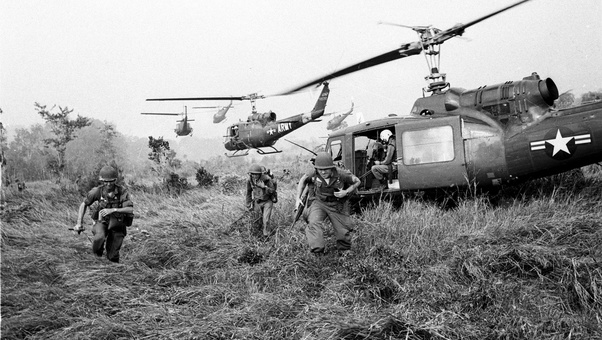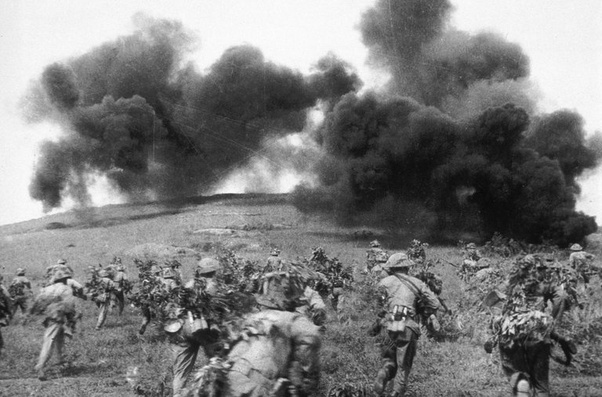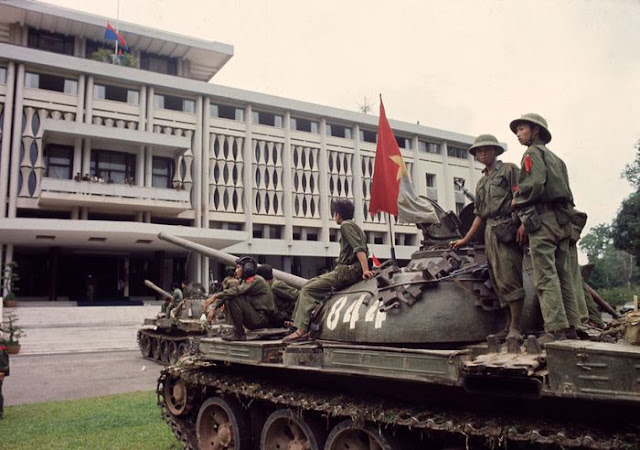First, we have to summarize these two wars.
The Korean War (also known as the Fatherland Liberation War as North Korea calls it), which took place from June 25th, 1950 to July 27th, 1953, was a war between the North Korean army (supported by Soviet and Chinese troops) and South Korea (supported mainly by US troops). The war began when North Korean troops attacked South Korea on June 25th, 1950, and later that year, the Chinese and American armies entered the war, which ended unofficially after the armies of both sides stopped at the 38th parallel and signed an Agreement at Panmunjom. Because that Agreement is an armistice, many historians believe that the war is still not over yet.
 |
| Chinese Army in the Korean War |
The Vietnam War (or the Resistance War against America to save the country), was started on November 1st, 1955 (as many documents agree) when the US Military Assistance Advisory Group (MAAG) was established in South Vietnam and ended with the event of April 30th, 1975 when the government of the Republic of Vietnam surrendered to the Provisional Revolutionary Government of the Republic of South Vietnam. This is a war between two sides, one side is the Democratic Republic of Vietnam with the support of allies in the Warsaw Pact, mainly the Soviet Union and China; the other side is the Republic of Vietnam with the support of the United States and its allies.
 |
| The US Army in Vietnam War |
There are many people today who equate the two wars with each
other, that is because they have some things in common such as: both countries were
divided, in the war there were supports from the superpowers that confronted each
other during the Cold War, etc… So let's clarify the differences between the
two wars, and also clarify why the Korean peninsula is so difficult to unify
(if not impossible).
The difference between the Vietnam War and the Korean War can
be summed up in a few of the following issues:
1. Starting points of the wars:
In 1945, Ho Chi Minh led the Vietnamese people to gain independence from Imperial Japan (also the French Empire) right after the Japanese army here surrendered to the Allies. At the end of September 1945, the Army of the Republic of China and the British army entered Vietnam to disarm the Japanese troops under the terms of the Yalta Conference. The Chinese army disarmed the Japanese in the north of Vietnam and the British did so in the south. Meanwhile, leader Ho Chi Minh declared Vietnam's independence on September 2nd, 1945 with the birth of the Democratic Republic of Vietnam. The French army followed the British army back to Vietnam to invade and the Vietnamese waged resistance against the French. In 1955, under the terms of the Geneva Accords, the French army withdrew from South Vietnam, but then the Americans replaced the French here and that was the beginning of Vietnam War.
 |
| The Vietnam Army in Indochina War |
The Korean peninsula in World War 2 was also occupied by Imperial Japan, and the armies of the Allied countries, specifically the Soviet Union and the United States, entered and disarmed the Japanese here, respectively in the north and the south of Korea. At that time, Korea was not yet an independent country. On August 15th, 1948, the South Korean government was established and almost a month later (September 9th), the North Korean government was established. On June 25th,1950, North Korean troops attacked South Korea and started the Korean War.
 |
| North Korean troops in Korean War |
Conclusion: the Vietnam War was a result of the war of independence turning into a proxy war; while the Korean War was a civil war turning into a proxy war.
2. Legitimacy and legalization of the governments
During the Indochina War and the Vietnam War, the government of the Democratic Republic of Vietnam had the legal basis and certificates to determine its legitimacy. And the invasion of the French consolidated this. Meanwhile, the birth of the Republic of Vietnam itself violated the Geneva Accords which was signed just a year before, when they denied implementing general election (was supposed to take place in July 1956). The Democratic Republic of Vietnam had also held a nationwide election to officially establish the government since 1946.
 |
| Election in Vietnam in 1946 |
At the same time, during the war, the government of the
Democratic Republic of Vietnam never recognized the legitimacy of the Republic
of Vietnam. The leaders of the two sides have also never had bilateral meetings
with each other and never set up a diplomatic system.
Both the government of the Democratic People's Republic of Korea and the government of the Republic of Korea were unable to present sufficient evidence and certificates to show their legitimacy to unify the country, both during and after the war. The two sides held their elections at the same time, meaning they held two elections to elect two governments, unlike Vietnam. The South Korean government proposed a general election for the, but North Korea abdicated it. Furthermore, both administrations have received legitimacy from each other and have had many meetings between leaders and officials. Both states joined the United Nations on September 17th, 1991.
 |
| Election in South Korea in 1948 |
Conclusion: In the Vietnam War, the government of
the Democratic Republic of Vietnam did
not recognize its enemy. In Korea, both governments have recognized each other.
3. Decisive role of countries in the wars:
The Koreans started but did not have their decision to end the war. The Chinese, the Soviets, and the Americans had much influence on the decision to end the war. Negotiations to discuss the armistice were held by United Nations Forces and the Chinese military.
 |
| The signing of the Korean Armistice Agreement |
The Vietnamese not only had the power to decide the beginning but also for the result of the war. They waged the national resistance against the French colonialists from the end of 1946 and ended the Vietnam War by themselves with the fall of Saigon on April 30th, 1975.
 |
| The fall of Sai Gon on April 30th, 1975 |
Conclusion: The Vietnamese decided the beginning and end of the war by themselves, the Koreans could not do that, but they were influenced by other countries.
Through the above-mentioned issues, we can redefine that: the
Korean War has major differences from the Vietnam War. So the comments that try
to equate the two wars with each other are incorrect.